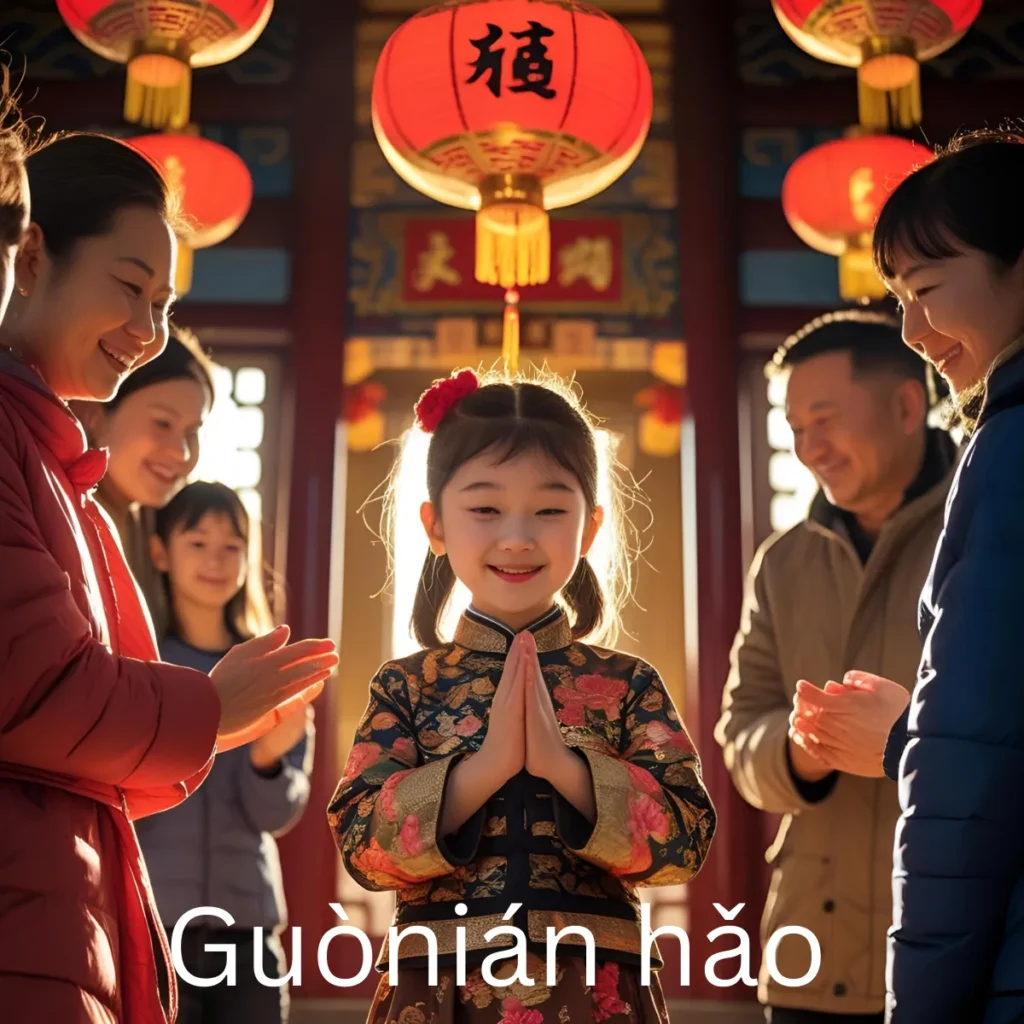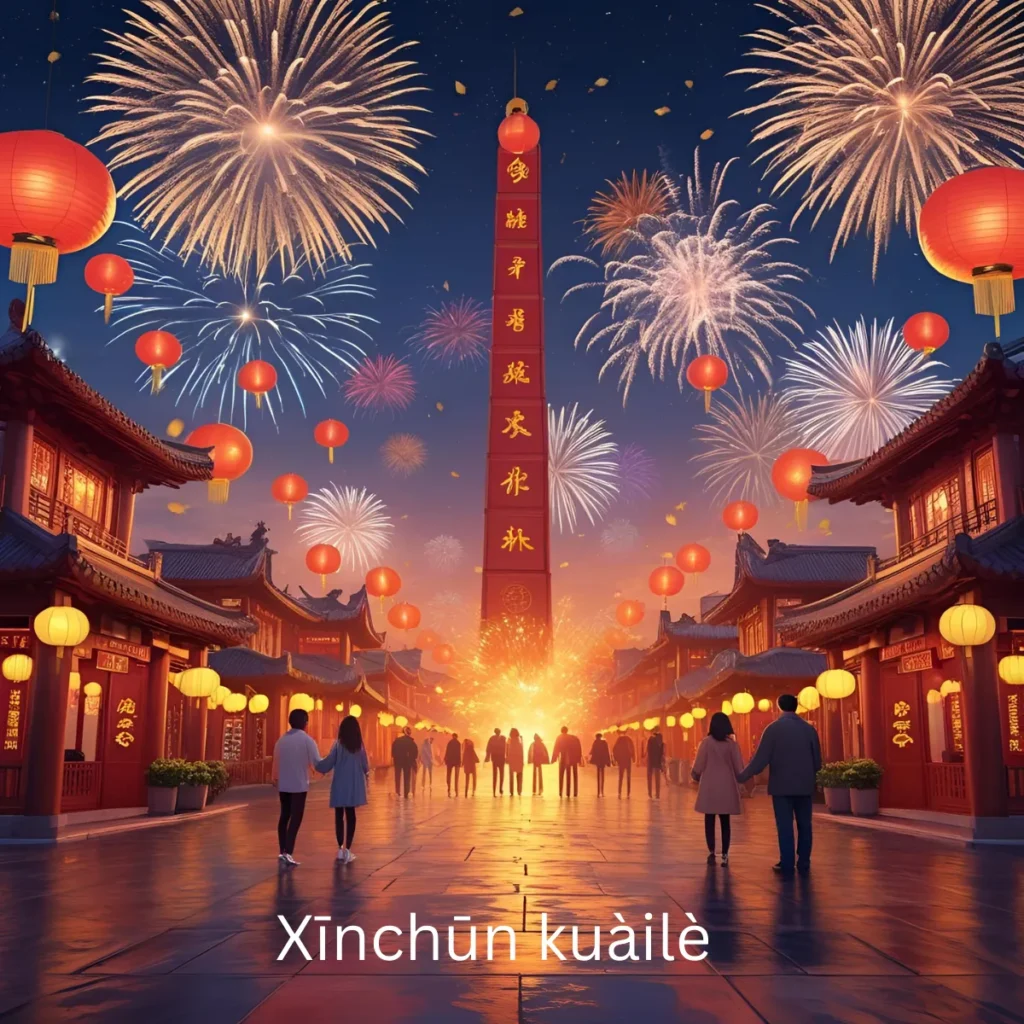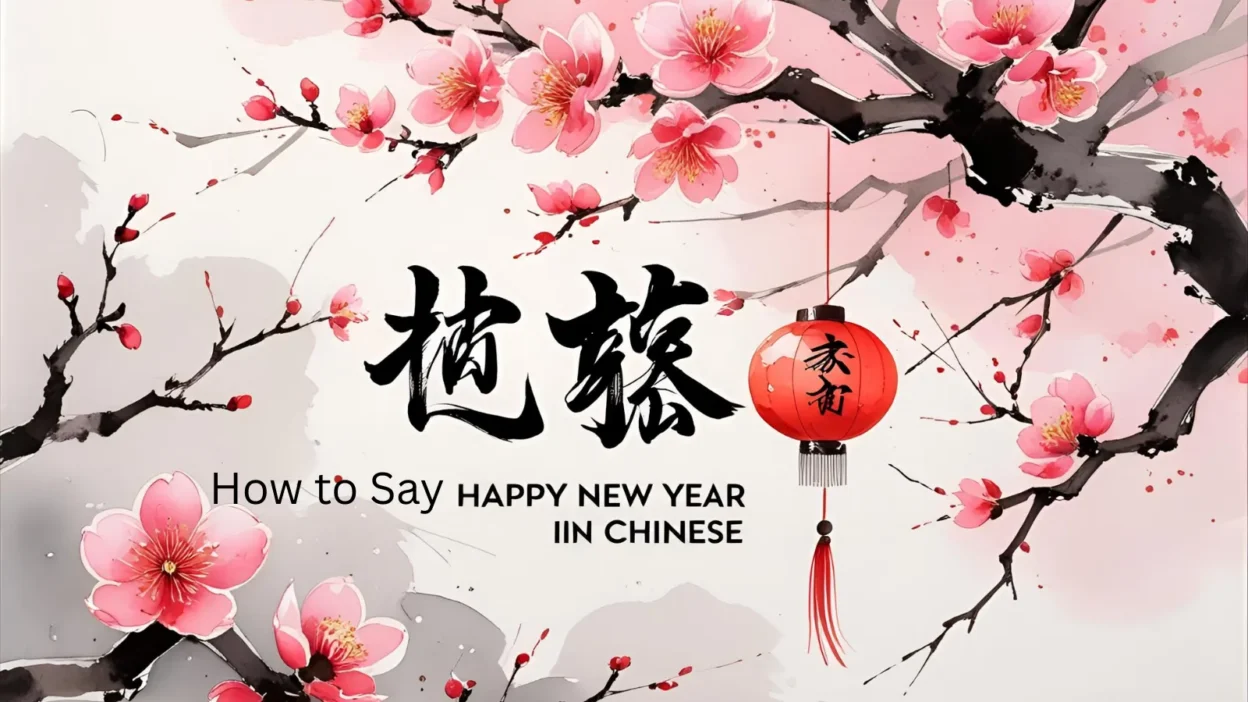Learning how to say Happy New Year in Chinese is a wonderful way to connect with native speakers and celebrate their traditions. The most common phrase is Xīnnián kuàilè (新年快乐), which literally means Happy New Year. By using this greeting, you can share warm wishes and join in the joy of Chinese New Year celebrations.
Knowing how to say Happy New Year in Chinese also helps you understand cultural values of happiness and prosperity. It’s a simple yet meaningful phrase that makes your greetings more authentic.
Say Happy New Year in Chinese
Let’s explore 15 ways to say Happy New Year in Chinese, complete with dialogue examples and cultural background.If you want to learn more, keep exploring our [language learning guide] for useful greetings in different languages!
15 phrases table for How to Say Happy New Year in Chinese:
| # | Chinese Phrase | Pinyin | English Meaning | Usage / Context |
|---|---|---|---|---|
| 1 | 新年快乐 | Xīnnián kuàilè | Happy New Year | Standard and most common greeting. |
| 2 | 过年好 | Guònián hǎo | Happy New Year | Informal, used during Chinese New Year. |
| 3 | 新年好 | Xīnnián hǎo | Good New Year | Friendly greeting at the start of the year. |
| 4 | 恭喜发财 | Gōngxǐ fācái | Wishing you wealth and prosperity | Very popular New Year blessing. |
| 5 | 万事如意 | Wànshì rúyì | May all go well with you | Polite, formal greeting. |
| 6 | 年年有余 | Niánnián yǒu yú | Wishing abundance every year | Common festive phrase. |
| 7 | 吉祥如意 | Jíxiáng rúyì | Good luck and everything as you wish | Warm, positive greeting. |
| 8 | 新年进步 | Xīnnián jìnbù | Progress in the New Year | Encouraging, often used in work/study. |
| 9 | 身体健康 | Shēntǐ jiànkāng | Wishing you good health | Formal and caring greeting. |
| 10 | 龙马精神 | Lóngmǎ jīngshén | Wishing you great vitality | Auspicious blessing. |
| 11 | 步步高升 | Bùbù gāoshēng | Wishing you promotion step by step | Often used in business. |
| 12 | 岁岁平安 | Suìsuì píng’ān | Wishing you peace year after year | Traditional warm wish. |
| 13 | 合家欢乐 | Héjiā huānlè | Happiness for the whole family | Used when greeting families. |
| 14 | 笑口常开 | Xiàokǒu cháng kāi | May your smile be ever present | Friendly, cheerful wish. |
| 15 | 新春快乐 | Xīnchūn kuàilè | Happy Spring Festival | Specifically for Chinese New Year. |
1. 新年快乐 (Xīnnián kuàilè) – Happy New Year
Origin:
The most standard and widely used phrase. “新年” means “new year,” and “快乐” means “happy.” Used throughout China, Taiwan, and globally.
Example:
👤 User A: 新年快乐!(Xīnnián kuàilè!)
👤 User B: 谢谢你,新年快乐!(Thank you, Happy New Year!)
Use: Universally appropriate and polite.
2. 过年好 (Guònián hǎo) – Wishing You a Good New Year

Origin:
Commonly used during Chinese New Year, especially among family and neighbors. “过年” refers to celebrating the lunar new year.
Example:
👤 User A: 叔叔,过年好!(Uncle, guònián hǎo!)
👤 User B: 哎呀,过年好过年好!(Ah yes, happy new year to you too!)
Use: Traditional greeting during Lunar New Year visits.
3. 恭喜发财 (Gōngxǐ fācái) – Wishing You Prosperity
Origin:
A Lunar New Year classic meaning “congratulations and may you get rich.” Often said with red envelopes!
Example:
👤 User A: 恭喜发财!(Gōngxǐ fācái!)
👤 User B: 红包拿来!(Give me a red envelope!)
Use: Festive and playful; very common.
4. 新春快乐 (Xīnchūn kuàilè) – Happy Spring Festival

Origin:
Refers to the Lunar New Year (Spring Festival) which starts with the new moon. Formal but joyful.
Example:
👤 User A: 新春快乐,阿姨!(Happy Spring Festival, Auntie!)
👤 User B: 谢谢,祝你万事如意!(Thanks, wishing you all the best!)
Use: Slightly formal; common in New Year cards or greetings.
5. 春节快乐 (Chūnjié kuàilè) – Happy Spring Festival
Origin:
Literally means “Happy Spring Festival” and is interchangeable with “新春快乐” but more common in mainland China.
Example:
👤 User A: 春节快乐!(Chūnjié kuàilè!)
👤 User B: 同乐同乐!(Same to you!)
Use: Widely used in business and formal contexts.
6. 万事如意 (Wànshì rúyì) – May Everything Go As You Wish
Origin:
An elegant, idiomatic blessing often used during New Year for good fortune in all areas of life.
Example:
👤 User A: 万事如意,老师!(Wànshì rúyì, teacher!)
👤 User B: 谢谢你!也祝你学业进步!(Thanks! Wishing you academic success!)
Use: Elegant and polite.
7. 新年好 (Xīnnián hǎo) – Good New Year

Origin:
A very casual and friendly way to greet someone during the first few days of the New Year.
Example:
👤 User A: 新年好,小明!(Xīnnián hǎo, Xiaoming!)
👤 User B: 新年好呀!(Happy New Year to you too!)
Use: Cheerful and friendly; great with peers and kids.
8. 吉祥如意 (Jíxiáng rúyì) – Auspiciousness and Success
Origin:
Common in written blessings, this phrase conveys deep wishes for success and good fortune.
Example:
👤 User A: 吉祥如意,老板!(Wishing you luck and success, boss!)
👤 User B: 谢谢你,也祝你步步高升!(Thanks, wishing you promotion after promotion!)
Use: Formal, often used in business greetings.
9. 年年有余 (Niánnián yǒu yú) – May You Have Surplus Every Year
Origin:
“余” sounds like “fish” in Chinese (鱼 yú), so this phrase is often paired with fish dishes during the New Year.
Example:
👤 User A: 年年有余!(Niánnián yǒu yú!)
👤 User B: 鱼也吃了,希望有余!(We ate the fish, so hopefully some surplus!)
Use: Clever and symbolic.
10. 大吉大利 (Dàjí dàlì) – Great Fortune and Profit
Origin:
A rhyming phrase popular in southern China and often seen on decorations.
Example:
👤 User A: 大吉大利!(Dàjí dàlì!)
👤 User B: 谢谢!财源广进!(Thanks! May money keep flowing in!)
Use: Poetic and celebratory.
11. 龙马精神 (Lóngmǎ jīngshén) – Spirit of a Dragon and Horse
Origin:
Refers to being full of energy and spirit—like a dragon and horse. Used metaphorically.
Example:
👤 User A: 祝您龙马精神!(Wishing you energy and vitality!)
👤 User B: 谢谢!新的一年一起加油!(Thanks! Let’s work hard together this year!)
Use: Respectful and literary.
12. 福星高照 (Fúxīng gāozhào) – May the Lucky Star Shine Bright
Origin:
An old blessing invoking the “star of fortune” to shine upon someone.
Example:
👤 User A: 祝你福星高照!(Wishing you great luck!)
👤 User B: 谢谢,希望咱们都好运连连!(Thanks, may we both be lucky!)
Use: Elegant; great for formal writing.
13. 岁岁平安 (Suìsuì píng’ān) – Peace Every Year
Origin:
This phrase is often used with the smashing of a porcelain bowl during Lunar New Year rituals to bring peace.
Example:
👤 User A: 岁岁平安,全家健康!(Peace every year and health for the family!)
👤 User B: 谢谢你,平安是福!(Thank you, peace is a blessing!)
Use: Deeply meaningful and family-oriented.
14. 迎春接福 (Yíngchūn jiēfú) – Welcome Spring and Receive Blessings
Origin:
A poetic phrase used in traditional couplets and banners around New Year.
Example:
👤 User A: 迎春接福,门上贴对联了吗?(Ready for spring? Got your red couplets up?)
👤 User B: 当然了,贴好了!(Of course, they’re up!)
Use: Poetic and cultural.
15. 合家欢乐 (Héjiā huānlè) – Joy for the Whole Family
Origin:
Used in family settings or greeting cards to wish everyone happiness together.
Example:
👤 User A: 合家欢乐,叔叔阿姨!(Wishing your whole family happiness!)
👤 User B: 谢谢孩子,新年吃饺子了没?(Thanks, kid—have you had dumplings yet?)
Use: Family-centered, heartfelt.
FAQs
1. How do you say Happy New Year in Mandarin Chinese?
The most common way is 新年快乐 (Xīnnián kuàilè), which literally means “Happy New Year.”
2. Is there a more formal way to greet someone for the New Year?
Yes, you can say 恭喜发财 (Gōngxǐ fācái), meaning “Wishing you prosperity,” often used in formal or festive settings.
3. Can I say Happy New Year to friends casually?
Yes! Simply say 新年好 (Xīnnián hǎo), which is friendly and polite for casual greetings.
4. What do people say in Chinese New Year cards?
Common phrases include 祝你新年快乐 (Zhù nǐ xīnnián kuàilè) – “Wishing you a Happy New Year.”
5. Are there traditional Chinese New Year wishes besides “Happy New Year”?
Yes! Examples: 身体健康 (Shēntǐ jiànkāng) – “Good health,” and 万事如意 (Wànshì rúyì) – “May all go well.”
6. How do kids usually say Happy New Year in China?
Kids often say 新年快乐 (Xīnnián kuàilè) excitedly to family, friends, and relatives.
7. Is there a regional difference in saying Happy New Year in China?
Mandarin speakers use 新年快乐, while Cantonese speakers might say 新年快樂 (San1 nin4 faai3 lok6).
8. Can I say Happy New Year over the phone or online?
Yes! Sending 新年快乐 in messages, texts, or video calls is very common.
9. How do you greet colleagues or clients for the New Year?
A polite option is 恭贺新禧 (Gōnghè xīnxǐ), which is formal and respectful for professional settings.
10. Are there playful or slang ways to say Happy New Year?
Some younger people may use emojis 🎉🎊 or short phrases like 新年快乐呀! (Xīnnián kuàilè ya!) in casual chats.
Conclusion:
Mastering how to say Happy New Year in Chinese allows you to celebrate this special occasion with respect and cultural understanding. Whether you say Xīnnián kuàilè (新年快乐) or other festive greetings, your words will spread joy and positivity. Start the new year by practicing these phrases and make your greetings more meaningful. 🎉



